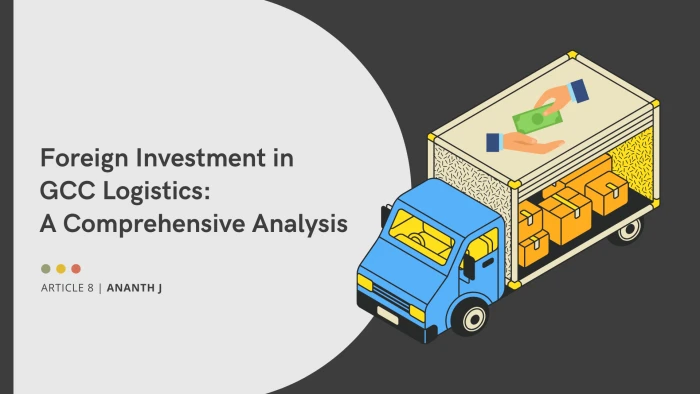Foreign investments are at the forefront of the burgeoning logistics sector of The Gulf Cooperation Council’s (GCC). The market is projected to reach USD 293.2 billion by 2033, growing at a CAGR of 5.70%. This growth is underpinned by extensive economic development activities, increasing consumer demands, and the region's strategic positioning as a global trade hub.
Saudi Arabia's ambitious plans include investments exceeding USD 2.66 billion to develop 18 new logistics zones, with the goal of increasing logistics zones from 22 to 59 by 2030.
This expansion is complemented by a growing focus on sustainability initiatives, exemplified by projects like Maersk's largest Logistics Park in the Middle East at Jebel Ali Port, which incorporates solar power and other eco-friendly solutions.
Together, these developments lay the foundation for why global logistics players are intensifying their presence in the region.
Global Logistics Players Establish Regional Headquarters in GCC Free Zones
The GCC's free zones have become magnets for global logistics companies, offering attractive benefits such as tax exemptions and full foreign ownership. DP World, operating from the Jebel Ali Free Zone, has recently partnered with Einride to implement electric, autonomous freight mobility solutions, managing 1,600 daily container movements by 2024. Maersk has established a significant presence with a 100,000 square meter warehouse in Dubai, focusing on integrated ocean and warehouse solutions. Other major players like Aramex are adopting innovative technologies such as drones and electric delivery vans for last-mile delivery, while Agility and DHL continue to expand their regional operations to support growing e-commerce demands.
This influx is further fueled by the competitive cost structures in these zones, which offer companies a financial edge while ensuring access to top-tier infrastructure. These cost benefits, combined with streamlined customs procedures and world-class infrastructure, continue to attract major global logistics players looking to establish or expand their presence in the region.
Chinese Investment in Ports and Logistics Parks as Part of Belt and Road Initiative
In parallel, the GCC’s growing role in China's global strategy is becoming more evident. China's Belt and Road Initiative (BRI) has significantly shaped investments in GCC logistics infrastructure, particularly in ports and logistics parks. The initiative has been instrumental in developing port infrastructure across the GCC, with Chinese companies actively participating in expansion and modernization projects.
These investments are strategically important for China, as the GCC's location provides critical access points between Asia, Europe, and Africa. The development of logistics parks complements port investments, creating comprehensive supply chain solutions that enhance the region's role as a logistics hub.
European Technology Providers Partner with Local Firms on Digital Transformation
Beyond physical infrastructure, the digital transformation of the logistics sector is gaining strong momentum, thanks to partnerships with European firms. European companies are playing a crucial role in the GCC's digital logistics transformation, with the digital transformation market expected to grow at a CAGR of 25.7% from 2024 to 2030.
These partnerships focus on implementing digital logistics solutions, smart logistics, and automation technologies. European firms are collaborating with GCC logistics companies to integrate AI, IoT, and big data analytics, enhancing operational efficiency and decision-making processes. Sustainability initiatives are also prominent, with European companies supporting the implementation of eco-friendly practices and green logistics solutions.
Investment Regulations and Incentives Driving Foreign Investment
A large part of this investment surge is a direct outcome of the GCC's strategic policy reforms. The GCC countries have established robust investment frameworks to attract foreign capital, particularly through Special Economic Zones (SEZs) and free zones. These zones offer significant tax incentives, including exemptions from customs duties and corporate taxes.
Recent regulatory reforms have focused on easing business operations, with the UAE reforming property laws to allow foreign ownership in specific commercial zones. The region's strategic location and extensive free trade agreements with major global economies further enhance its appeal as a logistics hub.
Technology and Innovation Investments in Logistics Infrastructure
The GCC logistics sector is witnessing substantial investments in emerging technologies and innovation. Automation and smart logistics solutions are becoming increasingly prevalent, with automated warehousing systems and robotics enhancing operational efficiency. The integration of AI and machine learning enables data-driven decision-making and optimizes various operations. Blockchain technology is gaining traction for secure and transparent shipment tracking, while IoT solutions provide real-time data on logistics operations.
The EU's Global Gateway initiative has established a strategic partnership with the GCC, focusing on digital transition and connectivity. This partnership includes significant projects such as the Medusa submarine cables and the 2Africa cable system, which extend to all GCC countries. These infrastructure developments are crucial for enhancing digital connectivity and supporting the logistics sector's digital transformation, while also promoting a human-centric approach to digitalization and emphasizing cooperation in the data economy and artificial intelligence.
Future Outlook and Market Opportunities in GCC Logistics
The future of GCC logistics presents compelling opportunities driven by economic diversification initiatives and technological advancement. Vision programs like Saudi Arabia's Vision 2030 and the UAE's Vision 2021 are catalyzing investments in infrastructure and logistics to support broader economic growth. The sector is witnessing increased adoption of advanced technologies, with the digital transformation market expected to grow at a significant rate. Sustainability is becoming a key focus area, with companies investing in green logistics solutions to reduce carbon footprints.
Foreign investment in GCC logistics continues to shape the region's emergence as a global logistics hub. The combination of strategic infrastructure development, technological advancement, and favorable investment policies has created an attractive environment for international investors. As the sector evolves, the integration of digital solutions and sustainable practices will further enhance the GCC's competitive position in the global logistics landscape.
The success of these investments is evident in the sector's robust growth projections and the increasing presence of major international players in the region. With continued focus on innovation and infrastructure development, the GCC logistics sector is well-positioned to maintain its growth trajectory and strengthen its role in global trade networks.
Sources:
https://www.iconcox.com/news/uae-and-ksa-emerging-global-logistics-hubs-infrastructure.html#:~:text=Free%20trade%20zones%20like,foreign%20ownership%2C%20and%20streamlined
https://www.nexstrat.ai/blog/gcc-logistics-sector-outlook-building-a-global-hub/#:~:text=Recognizing%20the%20need%20for,own%20100k%20sqm%20warehouse
https://www.mordorintelligence.com/industry-reports/gcc-freight-and-logistics-market#:~:text=of%20USD%201.6%20trillion,a%20global%20logistics%20hub%2C
https://www.ey.com/en_pk/services/tax/how-your-choice-of-a-special-economic-zone-in-the-gcc-can-impact-your-logistics-business-costs#:~:text=competitive.%20The%20following%20factors,In%20the%20case%20of
https://www.zawya.com/en/projects/construction/middle-east-leads-in-chinas-belt-and-road-initiative-with-39bln-in-investments-m7inkc16
https://policyreview.info/articles/news/eu-global-gateway-and-gulf-region#:~:text=a%20human%2Dcentric%20approach%20to,the%20GCC%20countries.%20Additionally%2C
https://www.orfonline.org/research/globe-al-pressures-for-tax-reforms-the-gcc-s-new-investment-attraction-challenge#:~:text=ensure%20that%20if%20multinationals,rather%20than%20another%20jurisdiction.
https://www.nexstrat.ai/blog/gcc-logistics-sector-outlook-building-a-global-hub/#:~:text=to%20focus%20on%20its,the%20air%20cargo%20side%2C
https://link.springer.com/article/10.1007/s44216-024-00040-6#:~:text=Initiative%20%28BRI%29%20is%20a,about%20the%20Gulf%20States%E2%80%99
https://saudilogisticsconsulting.com/insights/articles/opportunities-for-supply-chain-transformation-in-the-gcc#:~:text=recently%20paved%20the%20way,economic%20zone%E2%80%99%20with%20Apple
https://aiiem.org/the-future-of-logistics-and-transportation-in-the-gcc-trends-and-innovations/#:~:text=Blockchain%20technology%20is%20gaining,immutable%20ledger%20that%20records


